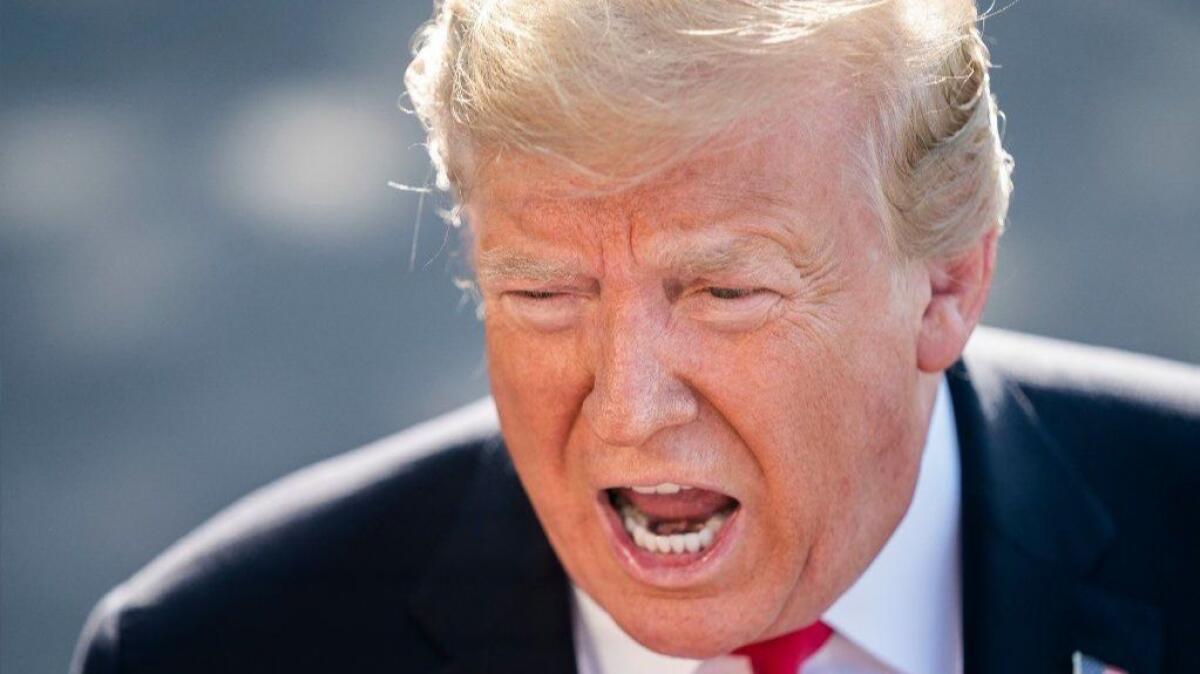How does Trump feel about Russian meddling? It depends on the time of day

- Share via
I feel for anyone who has to work in the fog of cognitive dissonance that must permeate the White House.
Check that — I don’t feel for Sarah Huckabee Sanders, who comes across as a willing cog in the dissonance machine. But dang, it must be hard to tell up from down and left from right in that building, given the endlessly shifting signals coming from President Trump.
Thursday’s developments provide a perfect example. The barrels of ink spilled over special counsel Robert S. Mueller III’s public comments, which many reporters interpreted as a not-so-subtle push for Congress to begin impeachment proceedings, got under Trump’s remarkably thin skin, prompting a tweet storm Thursday morning lashing out against Mueller and his staff. Nothing new there, except buried in one of the tweets was a stunning admission: that Russia had tried to help Trump win the 2016 election.
A mountain of evidence gathered by the U.S. intelligence community, Facebook and Mueller’s team make it well-nigh indisputible that Russia meddled in the 2016 campaign, both to amplify divisions in the country and, yes, to help Trump. How much effect those efforts had is debatable; I suspect that Trump would have won even if Russian operatives had stayed on the sidelines, but there are people smarter than I am who disagree.
In the face of all that evidence about interference, though, the president has gone back and forth over whether Russia intervened in the election on his behalf. He has said a few times that Russia did, but he’s said on more occasions that maybe it didn’t, or there’s no conclusive proof, or that he believes Russian President Vladimir Putin when he categorically denies any Russian involvement.
Perhaps the president’s tweet Thursday was a “Kinsley gaffe” — columnist Michael Kinsley’s term for when a politician blurts out the truth by mistake. That’s because Trump went back a few hours later to reassert his previous position.
A little after 8 a.m., while taking questions from reporters on the White House lawn, Trump retracted the Russia comment in his tweet. “No, Russia did not help me get elected,” Trump said. “You know who got me elected? I got me elected. Russia didn’t help me at all. Russia, if anything, I think, helped the other side.”
Yeah, that’s why Russian agents stole emails from the Democratic National Committee and Hillary Clinton’s campaign manager, then leaked them to the public — to help her.
Trump has also been head-spinning in his comments about Mueller, who’s gone from conflicted leader of a partisan “witch hunt” to honorable public servant, back to conflicted leader of a partisan “witch hunt” over a matter of weeks. The obvious problem with his attacks on Mueller’s team is that Trump can’t blast the team’s motives and methods while simultaneously pointing to its work as conclusive proof that he did nothing wrong.
Yet that’s exactly what he has been doing, and he did so again Thursday morning. After repeating the discredited allegation that Mueller was too conflicted to serve fairly as special counsel, he declared that Mueller “said, essentially, ‘You’re innocent.’” In Trump’s mind, that’s what it means when the people who were out to get him failed to bring any charges.
One of Mueller’s main points Wednesday, though, was that Justice Department rules do not allow sitting presidents to be indicted. So there were never going to be any charges brought against Trump for obstruction of justice; the only body that has the constitutional authority to take action against a president is Congress. But legal and constitutional niceties are lost on this president.
Enter the Fray: First takes on the news of the minute »
More to Read
A cure for the common opinion
Get thought-provoking perspectives with our weekly newsletter.
You may occasionally receive promotional content from the Los Angeles Times.










